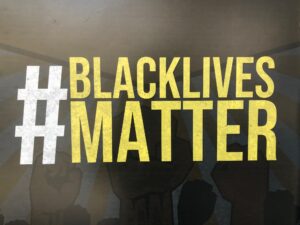
A store window in Englewood, New Jersey (photo by David Lat).
Many companies are changing or removing their brand names and logos in an effort to distance themselves from racial stereotypes. These long overdue actions are propelled by the Black Lives Matter movement, which over the past several months has awoken governments, individuals, and corporations to do more in the fight for racial equality.
Among the brands making a change from stereotypical and racist depictions of black servitude are Uncle Ben’s Rice, Mrs. Butterworth, and the famous, Aunt Jemima line of pancake and syrup products, the latter of which is no stranger to either the breakfast table or the news. For years, Quaker Oats, the company that owns the brand, has fielded complaints about the image portrayed by its breakfast brand. Aunt Jemima, who was once even pictured in a bandana and apron, harkened to a time of slavery and plantations. The company has just announced that it will donate at least $5 million over the next five years to support and engage in the black community in addition to changing the name of the Aunt Jemima brand.
The character of Aunt Jemima was inspired by a character from the song “Old Aunt Jemima.” Nancy Green, a former slave, is thought to be the first woman to travel the country portraying Aunt Jemima, as part of the 1893 World’s Fair in Chicago. Lillian Richards of Hawkins, Texas, was an employee of Quaker Oats, and she portrayed Aunt Jemima beginning in Dallas in 1925. In 1926, Quaker Oats purchased the Aunt Jemima Mills Company. Richards became synonymous with the Quaker Oats brand and traveled the country doing demonstrations and making appearances. Her family was reportedly not consulted prior to the brand change announcement.
Aunt Jemima was portrayed by several brand ambassadors through the years, as the brand developed and it officially trademarked the name “Aunt Jemima” in 1937. It opened a restaurant in Disneyland and developed a frozen food line. In 1989, Aunt Jemima’s appearance changed and she sported pearl earrings and a lace collar, as opposed to the bandana and apron of years passed. In 2001, PepsiCo purchased the brand.
This is not the first time that the Aunt Jemima brand has made news. In 2015, the alleged great-grandsons — Dannez W. Hunter and Larnell Evans, Jr. — of deceased brand ambassador, Anna Short Harrington, who played Aunt Jemima in the 1930s, sued PepsiCo and Quaker Oats, for royalties, with damages estimated at $3 billion. They lost the case as they could not provide any evidence that they represented the estate of Harrington in any capacity. They attempted to prove a connection via a photograph. Many did not fault the would-be heirs, who encountered much difficulty in tracing their genealogy. It can be arduous for relatives to prove relationships, especially at the instant time, when home births were common, birth certificates not written, and family records unpreserved.
The claimants argued that the Aunt Jemima image was based off of their relative’s face. Quaker Oats, argued that she is based on a fictional character. U.S. District Judge Edmond E. Chang in dismissing the claim, due to their lack of standing, did not focus on otherwise sticky issues such as the origins of the pancake recipe or whether Harrington had a contract with the company.
That lawsuit provides several important lessons with regard to estates. In order to sue on behalf of an estate one needs standing. In order to achieve standing as a personal representative, executor, or administrator of an estate, one needs to demonstrate to the probate court that they are either nominated under a valid agreement or next of kin. At that juncture the court will issue Letters Testamentary or Letters of Administration which will allow one to file a lawsuit on behalf of an estate.
Legal standing aside, Harrington’s great-grandchildren have again made the news, expressing disappointment as to Quaker Oats’ recent announcements. They have argued that the removal of the image represents an erasure of their great-grandmother’s black history and that the company has profited for decades off of images of slavery, calling the matter an injustice. Surely the name and branding changes will spark legal issues headlines to accompany our morning breakfast pancakes and syrup.
Cori A. Robinson is a solo practitioner having founded Cori A. Robinson PLLC, a New York and New Jersey law firm, in 2017. For more than a decade Cori has focused her law practice on trusts and estates and elder law including estate and Medicaid planning, probate and administration, estate litigation, and guardianships. She can be reached at cori@robinsonestatelaw.com.

